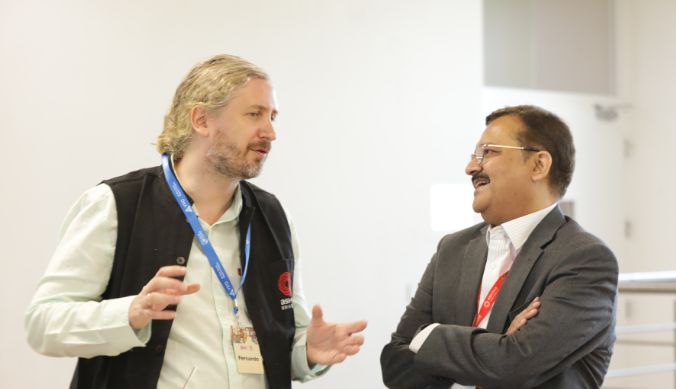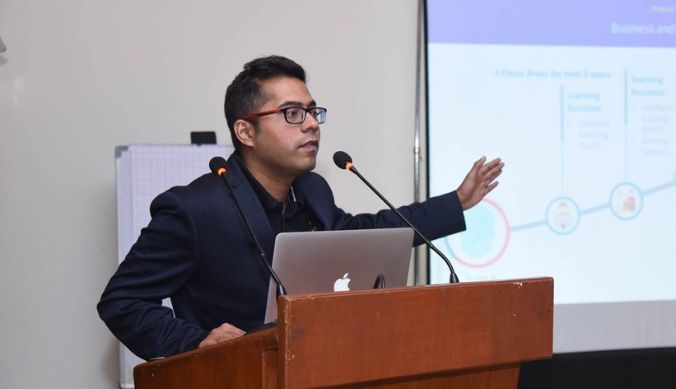#AshokaBookTower – ‘Climate of Conquest’ – Written by Prof Pratyay Nath, the book offers a fresh take on early modern South Asia through Mughal warfare
In this book, the author offers a fresh interpretation of the Mughal Empire by bringing together insights from environmental history and military history.

Office of PR & Communications
8 October, 2020 | 6 min readSynopsis:
What can war tell us about empire? In climate of conquest, Pratyay Nath seeks to answer this Question by focusing on the Mughals. He goes beyond the traditional way of studying war in terms of battles and technologies. Instead, he unravels the deep connection that the processes of war-making shared with the society, culture, environment, and politics of early modern South Asia. Climate of conquest closely studies the dynamics of the military campaigns that helped the Mughals conquer North India and project their power beyond it. The author argues that the diverse natural environment of South Asia deeply shaped Mughal military techniques and the course of imperial expansion. He also sheds light on the world of military logistics, labour, animals, and the organisation of war; the process of the formation of imperial frontiers; and the empire’s legitimisation of war and conquest. What emerges is a fresh interpretation of Mughal empire-building as a highly adaptive, flexible, and accommodative process.
In conversation with the author, Pratyay Nath, Assistant Professor of History, Ashoka University.
1. Please give an insight into the book ‘Climate of Conquest’.
This book offers a fresh interpretation of the Mughal Empire. Here I have studied the empire vis-à-vis two things – warfare and environment. My basic questions are simple. Firstly, what can we learn about the process of empire-formation by studying Mughal military campaigns? And secondly, how did the natural environment of South Asia influence Mughal war-making and empire-building? The book gathers my thoughts in response to these questions. In doing so, it brings three different fields in conversation with each other – imperial history, military history, and environmental history.
2. What was the inspiration behind writing the book? Why did you choose this particular topic?
You see, I have always been interested in the history of empires. As I studied more and more about the Mughal Empire during my college days, I realised that it’s a well-researched field. Yet, very few scholars had studied the empire in relation with warfare or environment. This made me curious. The more I studied around these two topics, I realised that they can offer us valuable insights into the nature of the empire. It was this idea that helped me finalise the topic of this book.
3. In this book you talked about military logistics, labour and the organisation of war. How does an act of war shape the geopolitics and subsequently history? Would you like to talk about the present time when the world constantly is witnessing one after the other major warfare/conflicts?
Well, wars have always been an integral part of human civilisation. The present wars are just one part of this much longer history. We all know that wars are violent and destructive. They kill people, destroy homes, wreck economies, ruin polities, and leave social scars that last forever. Yet, it is an activity humans have engaged in for almost as long as they have existed. I find this really intriguing.
4. Please talk about the historical research you did for this book.
The research for this particular book took me on a journey through various sorts of texts from the sixteenth and seventeenth centuries. One big part of this were Persian texts written by the Mughal elite. These include imperial biographies, autobiographies, and dynastic chronicles. These allowed me to look at the empire from its own perspective. Another set of texts comprise travelogues, journals, and letters left behind by European visitors to the Mughal Empire. Their value lies in the outsider’s perspective they offer on the ways of the Mughals. Finally, I also consulted vernacular literature written in two South Asian languages – Bengali and Assamese. They enabled me to see the empire through the eyes of people its subjects and rivals. A big part of my research was to analyse these various perspectives and develop my own understanding of the empire with their help.
5. Is there any anecdote from the time you were writing the book that you wish to share?
I chanced upon a brilliant digital game while writing this book – Total War: Attila. It is a strategy game set in Europe after the fall of the Western Roman Empire. I remember there was a phase when I used to play that game non-stop during the intervals I would take from writing. Believe it or not, fighting wars and building empires in medieval Europe within that game helped me a lot to get in the mood of writing about war and empire for my book.
6. Would you like to talk a little about your current and future projects?
Currently, I am writing my second book. It explores the role of warfare in the making of Akbar’s empire. Alongside this, I am working on several other projects. Their themes include environment and empire in the early modern world; history of the horse in South Asia; relationship between war and society; and methodologies of history-writing. I am also increasingly writing in the vernacular.
7. Historical fiction is one of the most popular genres. Have you ever considered writing something on those lines?
I enjoy reading historical fiction from time to time. My favourite author is Umberto Eco. I really love Baudolino! However, my ongoing research projects have not allowed me the time to think about writing fiction myself. I might consider it in the future.
8. Anything else you would like to share.
We live in times where researchers are increasingly asked to demonstrate the social relevance of their work. Funding and employment opportunities are increasingly being tied down to this idea that all research must somehow be useful to the present needs of states and societies. This is unfortunate, because it revolts against the very essence of academic research – a simple thirst for knowledge. Under these circumstances, I am really thankful to Ashoka University providing the robust and unconditional support that academic research like mine needs. I am also thankful to my students, who always keep me on my toes by challenging me intellectually inside and outside the classroom.
To know more about Pratyay Nath, click here.













